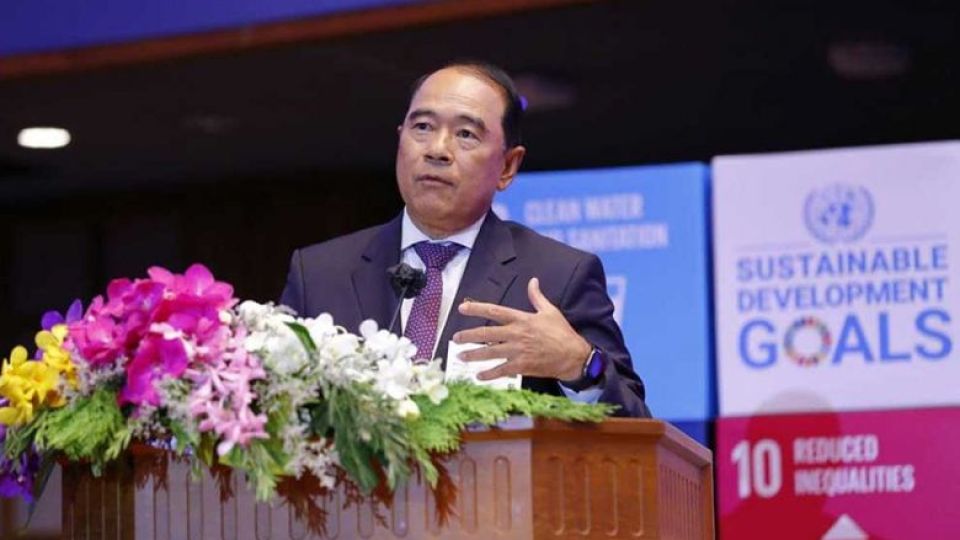May 26, 2022
PHNOM PENH – Cambodia has urged international development partners to cooperate with less developed countries (LDCs) in using UN-integrated national financing initiatives, a tool to spur nations’ sustainable development, in order to improve the green use of local resources.
The Integrated National Financing Framework (INFF) initiative developed by the UN “can offer a useful template for moving forward, by providing a holistic approach encompassing all resource flows, and linking their management to… the [UN] Sustainable Development Goals,” said Senior Minister Ly Thuch.
Thuch articulated this observation at the Special Body of Least Developed Countries, Landlocked Developing Countries and Pacific Island Developing States in the Thai capital Bangkok on May 25, a fringe event of the 78th Annual Session of the UN Economic and Social Commission for Asia and the Pacific (ESCAP).
Thuch, who is also chairman of the ESCAP National Committee, said the INFF and resources allocated under it can further develop Cambodia’s existing strategic financing arrangements.
He said that through the financing framework, the development partners could help LDCs engage in innovative, green and climate change-mitigating financing mechanisms, such as green or SDG bonds and impact investment to expand sources of development financing.
These bonds can commit the issuer to invest proceeds exclusively in green projects that generate climate or other environmental benefits, such as renewable energy, energy efficiency, sustainable waste management, land use and biodiversity, he said, adding: “They can provide a cheap, reliable and scalable source of capital for a variety of stakeholders involved in the 2030 Agenda.”
Thuch said that though many measures have been put in place to boost economic activity in the endemic phase of Covid-19, the Cambodian government has seen among its neighbours a “rapid and substantial increase” in demand for financing in particular, as government savings have diminished after more than a year of interventions.
“The coronavirus pandemic has tested our region’s solidarity, unity and compassion, and at a national level, has tested each country’s leadership, preparedness, financial and human resource and resolve,” he said.
“Our region needs to enhance and foster the solidarity, unity, cooperation and partnership among member states in its fight against current and future challenges [stemming] from geopolitical tensions, environment shocks and the pandemic.”
In anticipation of such problems, Thuch said the Cambodian government has focused on improving the efficiency of utilising limited government resources and on ensuring the sustainability of public finances.
The Kingdom’s new financing mechanisms have focused on the efficient use of existing resources, he said, while acknowledging that the mobilisation of new sources for financing must be done in line with remaining budget allowances and in accordance with the principles set out in the government’s Public Debt Management Strategy.
Thuch is leading the Cambodian delegation at the 78th annual session from May 23-27 under the theme “Joint Agenda for Promoting Sustainable Development in the Asia-Pacific Region”.
Delegates at the annual session will be discussing and shaping the future of regional cooperation, centred around a new form of multilateralism and regional cooperation, while the theme for the session hopes to spur discussions on pathways to achieve more inclusive and sustainable post-pandemic recovery.


